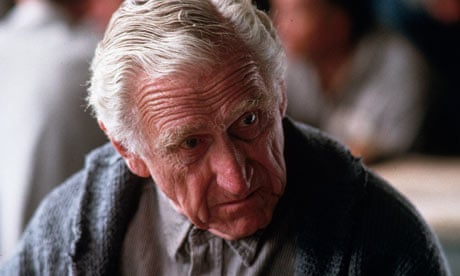James Whitmore, who has died of lung cancer aged 87, was known as "the supporting actors' Spencer Tracy" because of his professionalism and resemblance to the star. "I certainly wasn't the idol of millions. I just happened to get good parts," Whitmore once declared. "And so I wasn't worried ... because I could see these character parts stretching on into the dim days of the future." The short and stocky Whitmore, with his pugnacious face and gruff manner, often relieved by a wry smile, was a familiar face in 146 film and television parts over 58 years. In addition, he had a great success in one-man stage shows, impersonating Harry Truman, Theodore Roosevelt and Will Rogers. "I didn't think I could conceivably carry an evening by myself. I had difficulty holding the attention of my family," Whitmore joked.
He could also claim to have helped James Dean, who studied acting with him in Los Angeles, on the way to stardom. In 1951, Whitmore introduced Dean to "method acting" and advised him to go to the Actors Studio in New York. "I owe a lot to Whitmore," Dean said in a 1955 interview. "He told me I didn't know the difference between acting as a soft job and acting as a difficult art."
The son of the local park commissioner in White Plains, New York, Whitmore initially set out to become a lawyer when he gained a football scholarship at Yale University in 1938. He participated in college dramatics before interrupting his studies to join the US Marine corps when the US entered the second world war. While serving in the forces, he began his performing career with a USO tour through the south Pacific. After his discharge, he returned to New York to study acting at the American Theatre Wing and the Actors Studio, which he helped found.
In 1947, he made his Broadway debut in the military drama Command Decision, won a Tony in the first of many roles as a sergeant and, two years later, he earned his first Academy award nomination (and a Golden Globe) as best supporting actor for another sergeant in William Wellman's epic, Battleground (1949), only his second feature role. "The guts, gags and glory of a lot of wonderful guys!" read the publicity, with Whitmore typifying the toughness of the 101st Airborne division trapped during the siege of Bastogne.
Whitmore's first film was The Undercover Man (1949), in which he was well cast as a henchman of Glenn Ford's gang boss, which led to John Huston's masterful noir The Asphalt Jungle (1950), in which he is compelling as a hunchbacked getaway man. He also narrated Huston's Red Badge of Courage (1951), filling in the gaps in the story created by MGM's scissor-happy editors.
The studio gave Whitmore a few leading parts in their second features as ordinary Joes including Wellman's The Next Voice You Hear (1950). His wife was played by Nancy Davis, the future Mrs Reagan.
For the next few years, Whitmore was very active at MGM in supporting roles, most notably as Mario Lanza's sergeant in Because You're Mine (1952), and doing a comic duet (with Keenan Wynn) as Runyonesque gangsters advising Howard Keel to Brush Up Your Shakespeare in Kiss Me Kate (1953). It took Whitmore many weeks to learn the steps of the show-stopping number.
Whitmore was in uniform for the first four movies he made for Warner Bros in two years after moving there in 1954. He was also swallowed by a 12ft ant in Them! (1954). He had another rare lead in Don Siegel's Crime in the Streets (1956), very adroit as a sympathetic social worker. He was also excellent in Face of Fire (1959), based on Stephen Crane's story The Monster, as a much-loved handyman who gets hideously disfigured, and as a reporter in Black Like Me (1964) who takes drugs to pass for black in the south to experience racial prejudice. Numerous more conventional roles as army officers or western sidekicks, notably the knife thrower in Guns of the Magnificent Seven (1969) and Admiral Halsey in Tora! Tora! Tora! (1970) followed.
One of his greatest triumphs was in the theatre as Truman in Give 'em Hell, Harry! (1975). Whitmore was Oscar-nominated when it was filmed, uncannily capturing the essence of the president with humour and emotion. He was also remarkable in Will Rogers' USA (1974) and as Roosevelt in Bully (1977). Other stage roles included Sheridan Whiteside in The Man Who Came to Dinner, Norman Thayer in On Golden Pond and Joe Keller in Arthur Miller's All My Sons (which he recreated on television in 1986).
In 1994, in The Shawshank Redemption, he became known to a new generation as the prison librarian, unable to function on the outside. In 2000, the ever-energetic Whitmore won an Emmy as outstanding guest actor in the TV law series The Practice, and was nominated for Mr Sterling (2003) as the father of a US senator.
Whitmore is survived by his third wife, whom he married in 2001, and by his three children by his first wife, one of whom is the actor and television director James Whitmore Jr.
